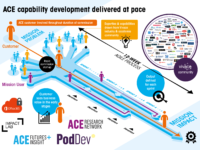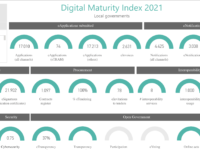The Ukraine war established a commitment to work across sectors to improve digital services to refugees. Focus on end user needs and an unbureaucratic organizational model have produced tangible results such as:
Better update of address information in national register
Electronic identification - access to digital services
Twelve agencies worked with obstacles and bottlenecks in the refugee's user journey, with the objective of good transitions between services.
Innovation Tag: Evaluation and Oversight
Officina is a lab for innovation in the public sector whose main objective is to catalyse the energy of young talents by offering them a transformative training programme. Officina was developed to address a triple urgency: future decision makers not perceiving the public sector as an attractive workplace; the public sector having high average age workforce and lack of innovative approaches; society at large needing a more modern and appealing public sector in this key historical moment.
The rate of innovation often exceeds the speed at which regulatory systems can adapt, blurring lines between sectors and cutting across transitional regulatory and geographical boundaries. The RPF aims to keep the UK at the forefront of regulatory thinking and experimentation. It sponsors projects, led by regulators, aiming to help create a UK regulatory environment that encourages business innovation and investment. It is market-led and uses real-world innovation settings to deliver.
With the Quality Tools an organisation can evaluate, monitor and compare the quality and use of its services within and between organisations. The tools include a Self-assessment, Customer Feedback and Utilisation Rate Measurement tool and are free of charge. The tools were developed primarily for public sector organisations to help them develop customer-oriented digital services and improve knowledge-based management. On a national level the tools provide data on the state of digitalisation.
BORA (acronym for "Online Relationship Database for Evaluators", in Brazilian Portuguese) is an innovative online application developed by ENAP that connects research professionals and policy managers around the country. The app makes it possible to link the needs of Brazilian public administration for high-quality policy analysis and the research of well-targeted projects by specialists based on a quick, transparent and free solution.
Case Study
Renovate or Rebuild: Using television to support the transition to sustainable housing in Australia

Renovate or Rebuild was a collaborative project that set out to increase the uptake of sustainable homes in the Australian residential sector. The show took an innovative approach to embed behavioural and building science into an engaging, yet informative and impactful TV series, that promoted and normalised sustainable homes. Research estimates this project could save Australians $600 million on their energy bills and would cost less than $1.60 for every tonne of greenhouse gas abated.
Intergenerational fairness—the idea that we should meet the needs of the present without compromising rights of future generations or citizens—is a defining theme of our time. Although most politicians and citizens value fairness, society does not have a way to assess the impact we’re having on future generations and advocate for them. This Framework for Intergenerational Fairness contributes to this. The Framework provides a pragmatic solution, whether as a young citizen, or public…
Government struggles to exploit advances in science and technology that could improve public services. The UK Home Office developed a new, cost-effective model to enable start-ups, Small and Medium-sized Enterprises (SMEs), not-for-profits and academia to solve frontline challenges across UK government using diverse, cutting-edge capabilities and expertise. Uniquely, for UK public sector, it uses flexible, novel ways of working and commercial mechanisms to deliver mission impact at pace.
Digital transformation is a long-term journey that involves complex changes. One of the challenges is how we evaluate the progress. We are inspired by the quote, "If you cannot measure it, you cannot improve it". Most of Catalonia's municipalities cannot do a digital assessment. The Digital Maturity Index provides an evaluation turnkey solution for local governments. It is based on open data, and it has a clear focus on public value impact.
The Future Tech Challenge (FTC) is a pilot initiative led by DPER to connect and collaborate across the wider ecosystem, and engage in transformative innovation by experimenting with, and applying new technology to address pressing public sector problems and opportunities that deliver improved services to the public. Drive innovation using emerging technology, enhance collaboration, meet National strategic priorities, generate knowledge & learnings and develop prototyped solutions.


